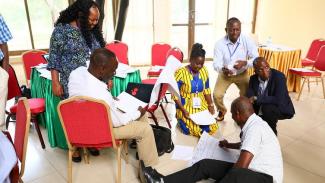Equity is vital to a strong and vibrant research and knowledge system
Equitable knowledge ecosystems
Our vision is of research and knowledge at the heart of development – where decisions are informed by relevant and rigorous evidence, and where knowledge is created with the communities it is intended to serve.
That requires many voices, many institutions and many types of knowledge. We call it an equitable knowledge ecosystem.
But at present knowledge systems are marked by exclusion. By the exclusion of Southern expertise from global debates. By the exclusion of women in many institutions and systems. By the exclusion of knowledge generated by communities and by practitioners. By the exclusion of those working and studying outside of the apex institutions where most funding and partnerships are concentrated.
A few institutions are privileged by greater funding and greater access to decision makers. Researchers in rural universities, or those outside capital cities, face additional barriers to securing research funding. Women don’t receive the training and mentoring afforded to men and their voices are neglected in research. Dominant scientific methods and measurement exclude important local knowledge.
If we don’t address inequities in research and knowledge, we will create islands of capacity and excellence, but we won't transform systems as a whole. This will fundamentally weaken the ability of countries and institutions to harness knowledge in the struggle against poverty and lack of opportunity.
Three strategies for equity
To address this we seek to do three things:
- We target our support to individuals with relatively fewer opportunities (many voices).
- We develop partnerships beyond apex universities and institutions (many institutions).
- We assist academics and students to connect with the users of knowledge (many types of knowledge).
Realising equity in practice
Our work to support higher education and research institutions, our work on gender, and our work on digital learning are all guided by this overall goal to support more equitable knowledge ecosystems.
AuthorAID, our community for early career researchers and our digital learning platform allow us to offer opportunities at scale, to around 7500 researchers and students in 130 countries. Our Voices of Early Career Researchers initiative aims to improve our understanding of the ambitions of scientists and scholars that are starting out on research careers, and the obstacles that they face.
Our partnerships with universities assist them to design research to engage more effectively with practitioners and policy makers, and to build new alliances with their communities and stakeholders to improve the relevance of their teaching.
In Uganda and Ethiopia we worked with partners to convene a series of dialogues on equity in the research system. These in turn have led to two national level initiatives working to address gender and equity in the research system - the Uganda Gender Equity in Research Alliance amd the Ethiopia Gender Forum.
Discover more
You can read more about what we mean by an equitable knowledge ecosystem in this concept note and in our 2020-2025 strategy, and in this reflection on what the pandemic exposed about our knowledge ecosystems.

